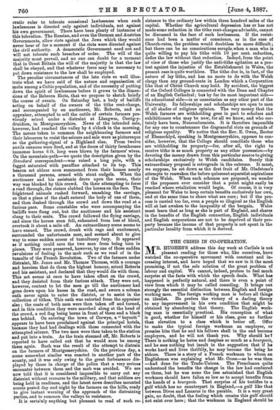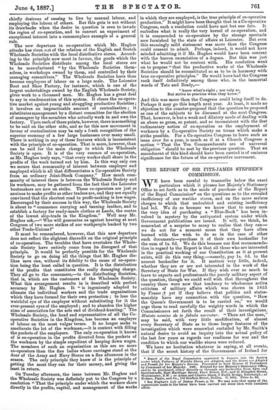THE CRISIS IN CO-OPERATION.
MR. HUGHES'S address this day week at Carlisle is not pleasant reading for those who, like ourselves, have watched the co-operative movement with constant and in- creasing interest, and have hoped that we saw in it the most promising, if not the sole solution of the great problem of labour and capital. We cannot, indeed, profess to feel much surprise at the facts with which the speech deals. What has happened is perfectly natural, and there is even a point of view from which it may be called consoling. It brings out strongly the essential distinction between English and foreign working men. The foreign working man is before all things an idealist. He prefers the victory of a darling theory to any improvement in his own condition that might be obtained by abandoning that theory. The English work- ing man is essentially practical. His conception of what is good, whether for himself or his class, goes no farther than elevation to a class which is better off. Offer to make the typical foreign workman an employer, or promise him that he and his fellows shall in the end become employers, and he will not thank you. Why should he There is nothing he hates and despises so much as a bourgeois, and he sees nothing but insult in the suggestion that if he works hard and lives thriftily, he may become the being he abhors. There is a story of a French workman to whom an Englishman was explaining what Mr. Cross—as he was then —had done for the Trade-Unions. The Frenchman quite understood the benefits the change in the law had conferred on them, but he was none the leas astonished that English workmen should have fallen so low as to accept benefits from the hands of a bourgeois. That surprise of his testifies to a gulf which has no counterpart in England,—a gulf like that between Dives and Lazarus in the parable. It is a very great gain, no doubt, that the feeling which creates this gulf should not exist over here ; that the workman in England should be
chiefly desirous of ceasing to live by manual labour, and employing the labour of others. But this gain is not without its drawbacks when the desire in question is seen to invade the region of co-operation, and to convert an experiment of exceptional interest into a commonplace example of a general rule.
The new departure in co-operation which Mr. Hughes attacks has risen oat of the relation of the English and Scotch Wholesale Societies with the local distributive stores. Accord- ing to the principle now most in favour, the goods which the Wholesale Societies distribute among the local stores are
to be manufactured " by the Wholesale Societies them- selves, in workshops owned by them, and controlled by their managing committees." The Wholesale Societies have thus become employers of labour on a large scale. The Leicester Boot and Shoe Factory, for instance, which is one of the largest undertakings owned by the English Wholesale Society, gives work to a thousand men. Mr. Hughes has a great deal to say in condemnation of this system. It closes the co-opera- tive market against young and struggling productive Societies ; it involves an impracticable amount of centralisation ; it substitutes management by a distant committee for the election of managers by the members who actually work in and own the factory. Upon each of these points, however, there is something to be said on the other side, and so far this new movement in favour of centralisation may be only a fresh recognition of the superior economy of a few large businesses over many small. There is nothing in any of these features which is inconsistent with the principle of co-operation. That is more, however, than can be said for the main charge to which the Wholesale Society is open. It is of the very essence of co-operation, as Mr. Hughes truly says, "that every worker shall share in the profits of the work turned out by him. In this way only can we secure that community of interest between employer and employed which is all that differentiates a Co-operative Society from an ordinary Joint-Stock Company." How much com- munity of interest there is between the Wholesale Society and its workmen, may be gathered from the fact that the Leicester bootmakers are now on strike. These co-operators are just as anxious to make profits as other traders are, and they are equally convinced that the shortest road to profit-making is low wages. Encouraged by their success in this way, the Wholesale Society is about to "commence currying and tanning leather, and to establish a factory for ready-made clothes at Leeds, the centre of the lowest slop-trade in the Kingdom." Well may Mr. Hughes ask,—" Who will guarantee us against hearing at next Congress of two more strikes of our workpeople backed by two other Trade-Unions I"
It must be remembered, however, that this new departure does not reflect the slightest discredit on the original principle of co-operation. The troubles that have overtaken the Whole- sale Society have entirely come from its disregard of that principle. It would be perfectly possible for the Wholesale Society to go on doing all the things that Mr. Hughes dis- likes save one, without its fidelity to the cause of co-opera- tion being the least called in question. It is the distribution of the profits that constitutes the really damaging charge. They all go to the consumers,—to the distributing Societies, that is, which are the customers of the Wholesale Society. What this arrangement results in is described with perfect accuracy by Mr. Hughes. It " is ingeniously adapted to alienate the individual workers and the trade organisations which they have formed for their own protection ; to lose the watchful eye of the employer without substituting for it the ever-present eyes of the employed; and to abandon the higher aims of association for the sole end of dividend-hunting." The Wholesale Society, the head and representative of all the Co- operative Societies in the Kingdom, has become an employer of labour on the most vulgar terms. It no longer seeks to ameliorate the lot of the workman,—it is content with filling the pockets of the employers. The only co-operation it knows of is co-operation in the profits diverted from the pockets of the workmen by the simple expedient of keeping down wages. The members of such an organisation as this are no more co-operators than the fine ladies whose carriages stand at the door of the Army and Navy Stores on a fine afternoon in the season. The only principle they know of is the principle of getting the most they can for their money, and giving the least in return.
On Tuesday afternoon, the issue between Mr. Hughes and the Wholesale Society was definitely put to the Congress by a resolution " That the principle under which the workers share directly in the profits, capital, and management of the works
in which they are employed, is the true principle of co-operative production." It might have been thought that in a Co-operative Congress, such a resolution could have met but one fate. It embodies what is really the very kernel of co-operation, and it is commended to co-operators by the strange spectacle now furnished by the state of affairs at Leicester. But even this seemingly mild statement was more than the Congress could consent to admit. Perhaps, indeed, it would not have minded admitting it if Mr. Hughes would have been content with the barren enunciation of a dogma. But this was just what he would not be content with. His resolution went on to propose "that the productive works of the Wholesale Societies should be reconstituted so as to be in harmony with true co-operative principles." He would have had the Congress rank itself definitively among those who, in the immortal words of Tate and Brady,— "know what's right ; nor only no,
Bat strive to practise what they know."
And this was more than the Congress could bring itself to do. Perhaps it may go this length next year. At least, it made no objection to the counter-proposal that the question be proposed as one of the subjects to be discussed at the next Congress. That, however, is but a weak and dilatory mode of dealing with an abuse so gross, so patent, and so inconsistent with the first rudimentary notion of co-operation as the employment of workmen by a Co-operative Society on terms which make a strike possible. For a 0o-operative Congress to leave such an issue over for a year, is much as if at a Church Congress a motion " That the Ten Commandments are of universal obligation " should be met by the previous question. That an. amendment of this kind should have been carried is of ominous significance for the future of the co-operative movement.



































 Previous page
Previous page